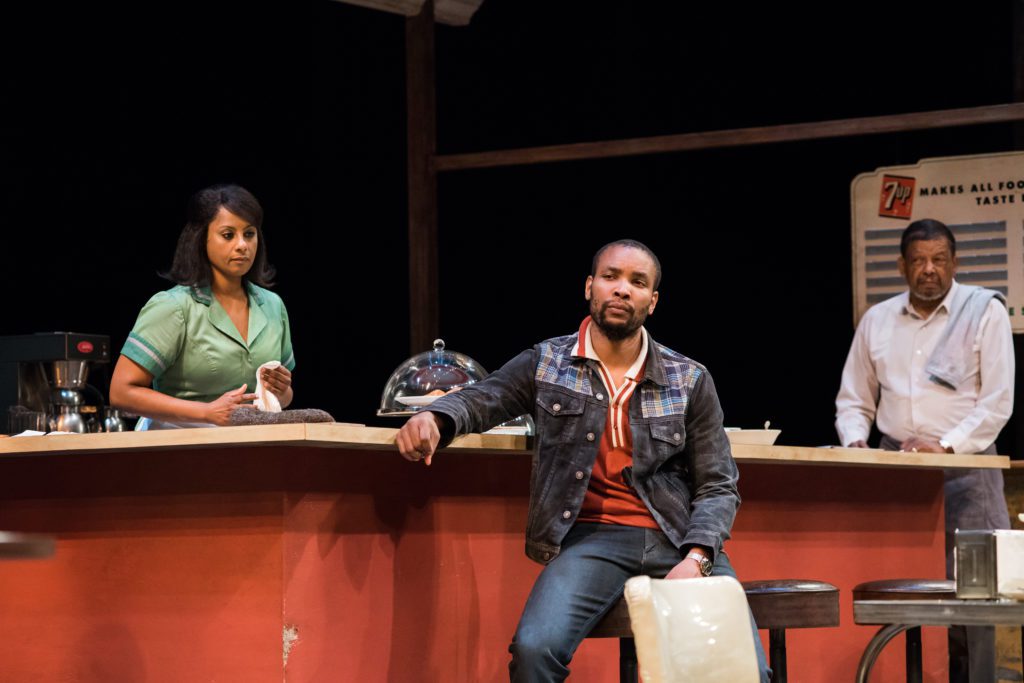Wilson’s ‘Two Trains’ at Arena Stage
By • March 8, 2018 0 1156

Carlton Byrd is back. And so is August Wilson.
Actor Carlton Byrd is returning to Washington, where he was last seen in a production of cutting-edge playwright Robert O’Hara’s “Antebellum.”
This time, he’s immersed in a strong cast in Arena Stage’s co-production (with Seattle Repertory Theatre) of Pulitzer Prize-winning African American playwright August Wilson’s “Two Trains Running.”
Byrd — who was part of the cast of “Two Trains” when it was performed in Seattle, playing the part of Sterling — is excited to return to the play and to Washington, both.
“It’s special to be in this play,” the Florida-born actor said. “It’s special to be back with some of the actors returning to it with me, but also because it’s August Wilson.”
Byrd’s appearance in “Antebellum” was at Woolly Mammoth. O’Hara is a controversial playwright of a different kind — witness “An Octoroon,” also at Woolly, a feverish, surreal play about plantation days, theater and race.
“‘Antebellum’ was pretty tough and strong and raw,” Byrd said. “My mother came to see it. She’s an elementary-school teacher, and she said, ‘Carlton, you are going to go through this play step by step for me and explain it.’
“This play, though, Wilson, he continually challenges you, and you become a part of the world he creates,” Byrd said. “I know people have called him the Shakespeare of African American playwrights, but it’s more than that.
“Certainly, it’s the language. It’s poetic, lyrical, but also gritty and authentic and real. And as an actor you can embrace it with passion.”
With the coming of “Two Trains Running” — rehearsals start mid-month, according to Byrd — Washington theatergoers will see why Wilson’s big epic, “The Pittsburgh Cycle,” is so fluid and appealing to all sorts of audiences.
“I could see that in Seattle, with the audiences,” Byrd said. “You had all kinds of people, and it depended on the time of day, literally. There would be young kids, high school age, who could get pretty vocal, because, well, they’re kids. There’d be people who lived through those times, and they were more thoughtful, reticent, but you could see it change through the course of the performance. It was as if they were giving themselves permission to respond.”
Wilson, who died in 2005 of liver cancer, certainly belongs in the ranks of America’s major all-at-once poetic, serious and great theater artists. Evidence of that came this past year, when the movie version of “Fences,” about the life of an often bitter former baseball player, played by Denzel Washington, became a critical and commercial hit.
A man of no small ambition, Wilson tried and succeeded to transform African American history into theatrical terms, writing a cycle of 10 plays set in and around the Hill District of Pittsburgh at various times over a 100-year period.
There is nothing static or museum-like about any of the plays. They are the epitome of storytelling. This is very much in evidence in “Two Trains Running,” in which every man and woman seems to be at home with a great monologue or two.
“The writing and the dialogue in this play are amazing,” Byrd said. “Their talk is story-talk, rich and detailed.”
Wilson’s range and influence in these plays is remarkable, from “Ma Rainey’s Black Bottom” to “Radio Golf” to the intense family play “The Piano Lesson” to “Seven Guitars,” “Jitney,” “Gem of the Ocean,” “Joe Turner’s Come and Gone” and “King Hedley II.”
Every time a Wilson play is performed in Washington, it’s a kind of homecoming, especially at Arena Stage and Studio Theatre, where this writer saw both “Two Trains” and “Ma Rainey.” Yaphett Katto starred in a production of “Fences” at Arena.
Byrd said that Sterling, the character he plays in “Two Trains Running,” is a “man who’s just been released from prison and wants to rise above that. He wants to succeed, to work, to lead a good life. He’s ambitious. And then he meets a woman and then that’s what he wants.”
Wilson’s plays — “Two Trains” is no exception — are acutely both resistant and accommodating, chameleon-like to the passage of time. Rather than dated, they become freighted with time. “Two Trains” takes place in a diner in 1969, a year after Martin Luther King’s death, and while King and Malcolm X are talked about, they are not central to the play. But the conditions of the times are.
“Everybody reacts differently,” Byrd said of the audiences.
That’s true today, with the dramatic presence of the Black Lives Matter movement adding to the play and pulling it into the here and now. Though set in a single community, Wilson’s plays, filled with authentic and moving voices, speak to the African American — and American — experience as a whole.

